Morir de asfixia
¡Imagínate lo alto que ha subido el pastor! ¿Por qué cree que va a morir de asfixia? Respuesta
Este cuento es una adaptación de “The Last Wish”, el cuento que cierra la colección de Edith Nesbit, Five Children and It, publicado en 1902 como expansión de la serie de historietas publicadas en The Strand Magazine en 1900. Es el primer libro de una trilogía. En él, un grupo de niños, al cavar un hoyo, encuentra un genio de la arena, Psammead (Enarenado en la traducción de Calleja), capaz de conceder deseos. El libro narra cómo los niños descubren los problemas que pueden surgir de los deseos mal formulados.
Te habrás dado cuenta de que hay un error en el título. Las imprentas a principios del siglo XX todavía utilizaban tipos móviles (el impresor tenía que seleccionar cada letra del texto por separado y colocarla en la plancha de cada una de las páginas), por eso era muy difícil no cometer ningún error.
Los niños están pensando qué desean hoy, ¿qué deseas tú? ¿Por qué no haces tu lista de deseos? Pero recuerda, hay que tener cuidado, porque, a veces, lo que deseamos nos puede traer problemas. Piénsalo bien, como dice Antera.
Muchas historias de aventuras y cuentos comienzan con un robo, pues es una buena manera de proponer algo que luego tenga que ser resuelto.
Te invitamos a que busques qué cuentos tradicionales contienen un robo al principio de la historia. Te proponemos leer “La dama y el león” o “Lindo clavel” si no los conoces, son algunos cuentos menos conocidos de los Hermanos Grimm.
Y tu mamá, ¿tiene muchas joyas? ¿Tiene alguna joya, como un colgante o un anillo, que tenga un valor especial para ella? ¿Por qué no se lo preguntas?
Quizá, después podrías escribir una historia sobre esa joya tan especial.

Cuando estamos hablando de joyas, un solitario se refiere a un diamante grueso que se engasta solo en la joya, muchas veces, en un anillo.
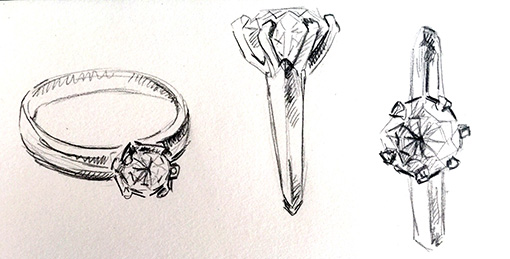
Un armario de luna es un armario que tiene un espejo en la puerta que permite que te veas entero.

Es una palabra que se utilizaba antiguamente para referirse a un armario.
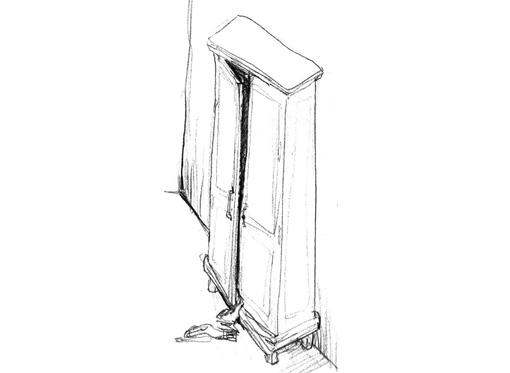
Cuando hablamos de “aderezos” relacionados con la joyería, nos referimos a un juego de joyas que se compone de collar, pendientes y pulseras o anillos.
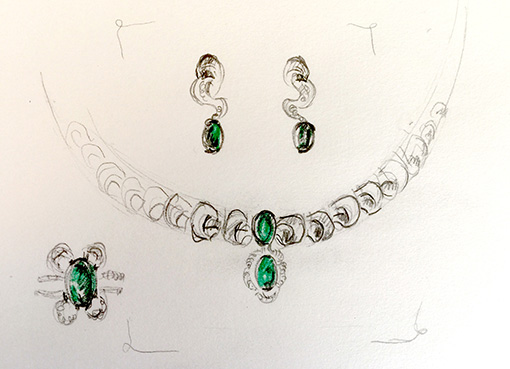
Las tiaras son diademas, pero de joyas, como las que usan las princesas.
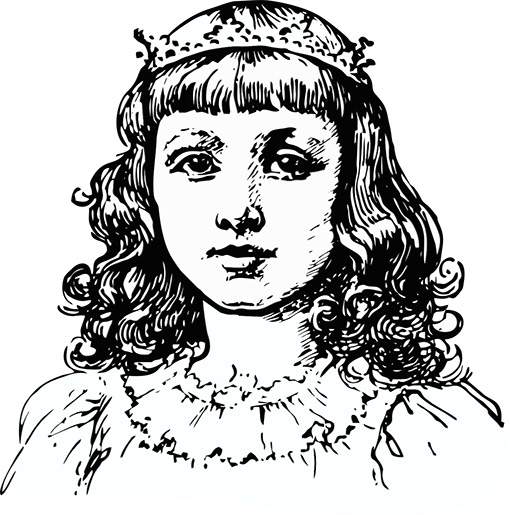
Cirilo no quiere que Juanita le cuente la verdad a mamá porque piensa que no les va a creer y se va a enfadar más. Tú, ¿qué crees que es mejor? ¿Hubiese sido mejor contarle las cosas como realmente fueron? ¿Les habría creído mamá? ¿Qué otras historias le podrían haber contado? A ver cuántas se os ocurren a ti y a tus compañeros.
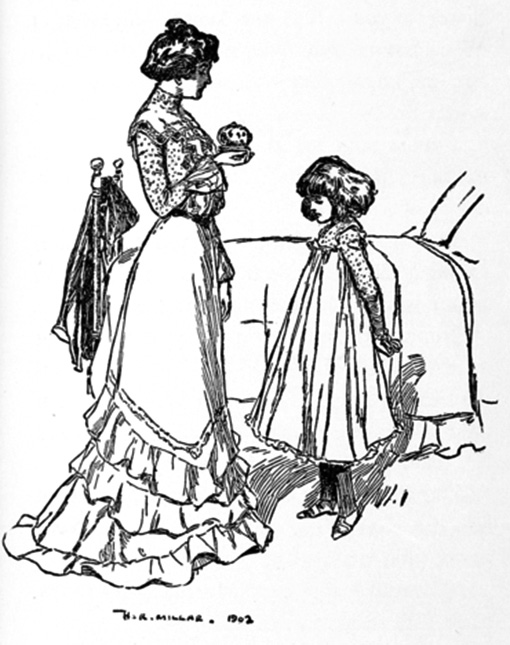
Ilustración original del cuento de Nesbit por H. R. Millar.
Una alquería es una casa de labor. Normalmente, nos referimos a todo el conjunto de la casa pero aquí, por el contexto, parece que se refiere a la casa de labor de fuera de la casa en la que viven. En España, estas casas de labor con finca agrícola alrededor son típicas de la parte de Levante.
La mamá de los chicos actúa con una tranquilidad y una valentía que sorprende a los niños, ¿es también tu mamá así de valiente? ¿Por qué no le preguntas qué haría ella si os pasase lo mismo?
En este fragmento, Enarenado habla de los deseos de los mayores y menciona los impuestos progresivos, el sistema de pensiones y de un plan de enseñanza libre. Los impuestos progresivos son aquellos en los que pagan más los que tienen más, de manera que se beneficia a los que tienen más problemas económicos. Los planes de pensiones sirven para que las personas mayores y jubiladas reciban al mes un dinero que les permita vivir. Por último, la enseñanza libre es la que no ajusta lo que enseña a ningún dogma político, moral o religioso. Hoy en día, todo esto nos parece más o menos normal, pero a principios del siglo XX no existía. Al hablar de ello, el autor está haciendo un guiño a los mayores haciendo alusión al modelo de sociedad que quiere y las cosas que considera importantes. ¿Qué cosas crees que son importantes para los mayores hoy? ¿Por qué no haces el experimento de escribir una lista de cosas que crees que los mayores pedirían hoy al Enarenado y luego lo hablas con tu papá y tu mamá a ver si piensan lo mismo?
A veces, los cuentos no acaban de forma cerrada, es decir, no se atan todos los cabos, sino que se dejan puertas abiertas para que la historia continúe. Eso es lo que pasa en este cuento. Si te acuerdas, al principio decíamos que las historias del Enarenado se publicaron por primera vez en la prensa periódica y, seguramente, es esa la razón de que el cuento termine con esta frase que nos deja tan llenos de intriga. Nosotros no tenemos más de sus aventuras aquí, pero sí tenemos la imaginación para crear las aventuras que vivieron los niños cuando volvieron a ver al Enarenado. ¿Por qué no escribís una de esas historias? Podéis escribir una tus compañeros y compañeras y tú o escribir una cada uno y luego juntarlas para hacer un libro, como hizo Edith Nesbit.
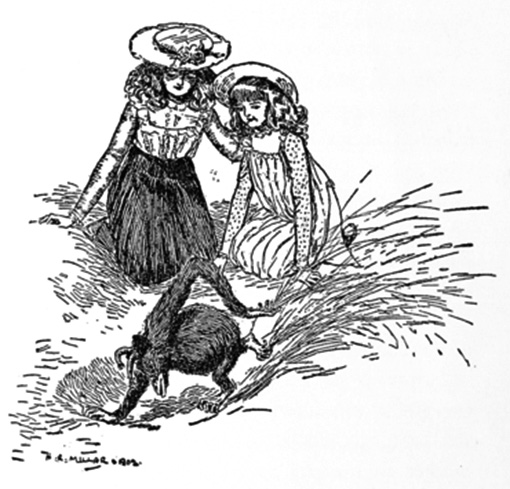
El guardapolvo es una prenda que se coloca sobre la ropa para protegerla de la suciedad. Una bata de científico, por ejemplo, podría considerarse un guardapolvo. También lo son algunas piezas de los uniformes escolares, como los babis, que suelen utilizarse en preescolar.

¿Qué piensa en secreto Enrique de su hermana y qué le dice en voz alta? ¿Por qué crees que no es sincero?¿Alguna vez Eufemia le dice a Enrique algo parecido?
Esta frase nos dio otra pista para situar el origen de los cuentos en Inglaterra, pues en España no es habitual que en una ciudad haya muchas iglesias de San Jorge. En Madrid, solo hay una en la calle de Núñez de Balboa, que además es anglicana, mientras que en Londres encontrar la iglesia donde estuviera el santo era un verdadero dilema, ¡pues hay quince! (Hay que apuntar que San Jorge es un santo especialmente admirado en Inglaterra, siendo el patrono de la monarquía inglesa desde el siglo XIV).

Aquí, San Jorge se refiere a una expresión o frase que refleja su pensamiento, sus ideales personales. Para él, un hombre solo puede acabar con un dragón, no con varios. Así, su lema sirve como disculpa, ya que es incapaz de acabar con todos los dragones sin ayuda de nadie más.
La espita es un dispositivo que, como un grifo, permite regular la salida de líquidos de un recipiente. Antiguamente, se utilizaba en los barriles de madera o en las vasijas de barro, por ejemplo. En el cuarto de baño «mágico» del cuento su apertura o cierre regula el clima del país de los niños protagonistas. Nos parece interesante que en el cuento aparezca una especie de cuarto de baño en una cueva. Los cuartos de baño tal y como los conocemos ahora eran una gran novedad cuando Edith Nesbit compuso esta historia en 1899. El primer váter moderno lo inventó Thomas William Twyford, un fabricante de cerámica, en 1885. Durante esa época se perfeccionó el sistema de tuberías y alcantarillado de las ciudades y las casas empezaron a tener una habitación especialmente dedicada al aseo.

¡Imagínate lo alto que ha subido el pastor! ¿Por qué cree que va a morir de asfixia? Respuesta
Finalmente, aparece Dios para salvar al pastor, ¿qué te parece este final? ¿Es el que esperabas? En realidad, lo de hacer aparecer a un Dios (u otro elemento externo a la trama y, generalmente, mágico) para que, de pronto, resuelva la situación, aunque no tenga mucho que ver con el resto de la historia, es un recurso que ya usaban los griegos en sus tragedias y que se llama "Deus ex machina". Sin embargo, no es una forma de resolver la trama muy recomendable, pues no guarda coherencia con el resto del argumento. ¿Se te ocurre una forma mejor de acabar este cuento? Escríbela.
Al final, todo había sido un sueño. ¿Conoces otras historias en las que todo se resuelva al despertar y no haya ocurrido de verdad? ¿Has leído Alicia en el país de las maravillas?

Ilustración de sir John Tenniel (1820-1914), para la novela original de Alicia en el País de las Maravillas (1865), de Lewis Carroll.
Los pueblos y ciudades no solo son gobernados por un alcalde o alcaldesa, sino que, en el Ayuntamiento, también trabajan otras personas, que son las que forman el Concejo. A estos empleados se les conoce como «concejales», y se especializan en diversas áreas de gobierno, por lo que existen concejales de cultura, de educación, de sanidad, de medio ambiente y muchos más.
¿Te parece justo para Eufemia y Enrique el final del cuento? Piensa sobre por qué los adultos no agradecen a los niños su hazaña e imagina un final diferente para el cuento. Puedes poner por escrito ese final aquí.
The Duchess of Grandville has many jewels and the children’s mother only a few. This is probably because the Duchess is a wealthy aristocrat and the children's mother is middle-class. Can you think of three advantages and three disadvantages of being an aristocrat at the beginning of the 20th century (when the book was written)?
A few books and films start with a jewelry robbery, especially in crime fiction and detective stories.
Tintin is a comic book character who works as a reporter but spends his time investigating and solving crimes. One of the issues, The Castafiore Emerald, is about the robbery of a big jewel.

The children wished their mother had the robbed jewels. Why do you think that is? Is that a sensible wish? Do you think their mother would like to have somebody else's jewels?
A noblewoman.
Example: The duchess lived in a huge villa in the countryside.
To return to a normal state after something unpleasant has happened, typically an illness.
Example: He is recovering from the cold really well. He doesn't have a fever anymore. He has a lot more energy and feels stronger.
A spirit with magical powers.
Example: When Aladdin rubbed the lamp, a genie appeared.
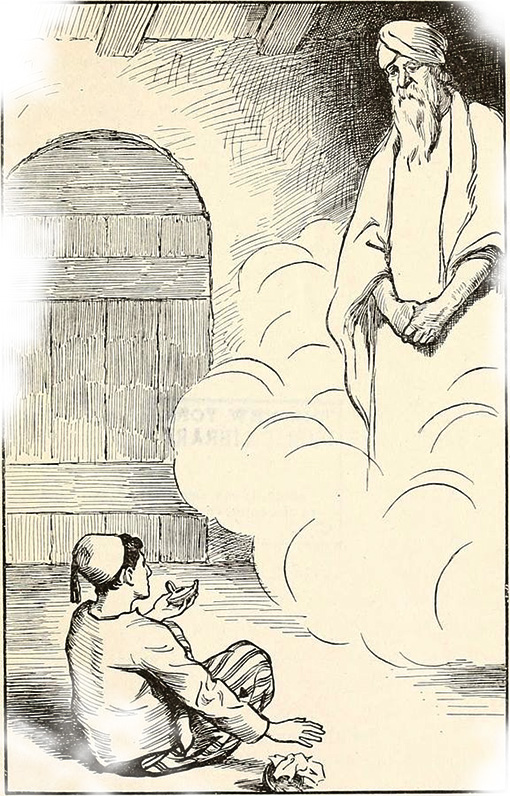
To agree to give something to someone.
Example: The teacher granted me permission to go to the bathroom.
In a manner that avoids risks; carefully.
Example: He drove cautiously because it was dark and raining.
The person who is hired to do the main house chores (tasks), such as cooking and cleaning.
Example: This morning we picked up all our toys and put them in the toy-box so that the housekeeper could clean the floors.

An event where someone stole something. (To "rob" is another word for "steal".)
Example: The was a robbery at the museum; many famous paintings were stolen.
A piece of jewellery, such as a necklace, a ring, or a bracelet.
Example: My mum keeps all her jewels in a beautiful little box.
A piece of jewellery that people pin on their clothes.
Example: During December she wore a Christmas tree brooch on her coat.

Terrified, shocked.
Example: He looked aghast as if he had seen a ghost.
In this scene, the children are trying to stop their mother from going upstairs without any success.
If you were one of the children, what would you do to stop her? Think about three different strategies.
Once you are done, share your thoughts with your partners and reach an agreement about which idea could be most effective in the context of the story.
To implore, to supplicate.
Example: We begged our teacher to let us play again that game we liked so much. She said yes.
The act of taking something back; removing.
Example: The toy company announced the withdrawal of one of their robotic toys because it didn't function correctly.
Showing great interest, enthusiastically.
Example: We eagerly waited for her arrival at the airport; it has been a long time since we had seen grandma.
Happiness.
Example: You could see the joy in her face when she opened her birthday present.
Something extremely bad, terrible, or fearful.
Example: Not studying for the test has been a dreadful mistake. Now I'll have to learn all of it during the summer time.
An expression, a strong desire to know about something.
Example: Please tell me who won the match last night! I'm burning with curiosity.
A table with a mirror and drawers where women would keep their jewellery, hair brushes, make-up and perfumes; they would sit in front of it and get ready (brush their hair, apply make-up, look at themselves in the mirror).
Example: Every morning after taking a bath she would sit at her dressing table and get ready for the day.
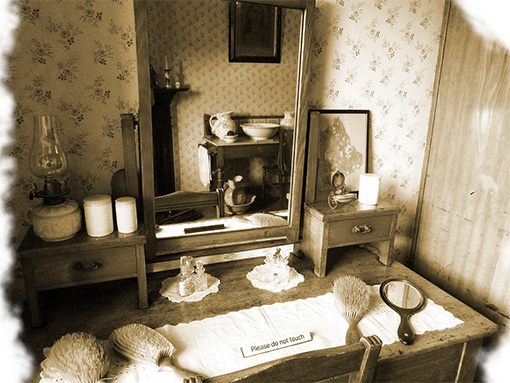
A little (wooden) box to protect jewellery.
Example: After wearing it, she put the necklace carefully back into its case.
Very valuable.
Example: The palace is full of priceless antiques.
Another word for "dressing table" (see vocabulary note on the previous page).
Suddenly start crying.
Example: The baby always bursts into tears whenever he is tired or hungry.
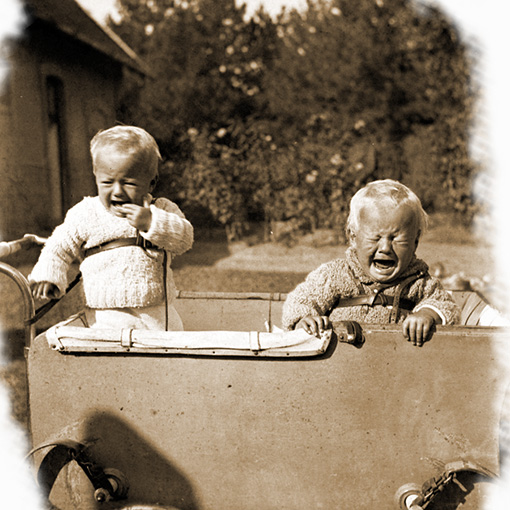
Working in groups, think about what you should tell the mother when she asked to hear the truth. Or maybe you wouldn't tell her all the truth?
In the story, Cyril has been rude to his sister. He ordered her to stop talking and insulted her, which is a pejorative comment. Do you think he has any reason to do it?
Now, write down three different ways to talk to Joanna without being disrespectful.
As we have read, Robert proposes to wait until his father arrives before calling the police. Why do you think he did it?
As we saw in the story, Martha's behaviour wasn't appropiate. Do you think she deserves to be forgiven?
Write down three reasons to forgive her and three reasons not to. Then, share them with a partner and decide if she deserves to be forgiven or not.

In the time the story was written, it was common in families of high society to have many servants. In the story, we found out there are different house helpers in the children's house: a housekeeper, a maid and a cook.
Working in groups, write down three different tasks each of them do.
Once you are done, each member of the group should write who in his/her family does all those tasks.
Locked them up (lock something up) To shut a place so that nobody can get in or out.
Example: I was locked up in the lift for five minutes.
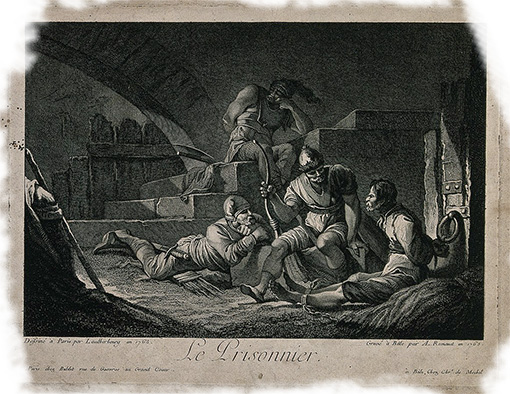
An expression you can use when you want to make sure someone understands what you are saying or doing.
Example: "Don't get me wrong; this subject is easy but you still need to study."
A wheeled vehicle that was used before cars existed, pulled by one or more horses.
Example: Cinderella went to the ball in a carriage.
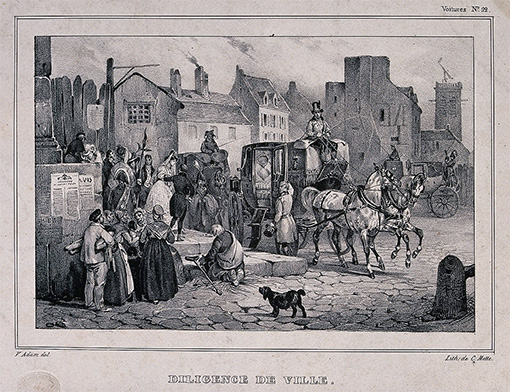
The main house on a farm where the farmers and their family live.
Example: Traditional farmhouses are made with local building materials and have a fireplace for cooking and heating.
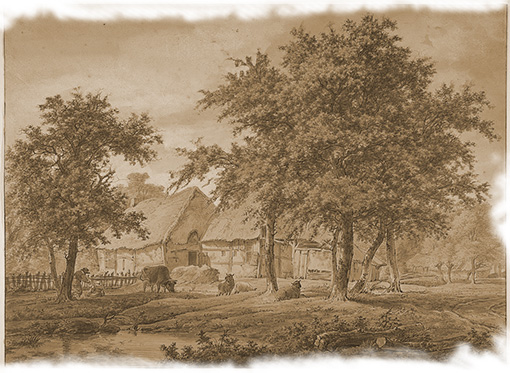
As we have read, in order to warn the police, the mother needs a carriage to drive to the police station and tell them because telephones only started to be available to the regular public around 1930, years after the publication of our story.

Jump up and down.
Example: The ball bounced several times before disappearing behind the bushes.
In our story we have seen different terms related to crime. For example, thieves or robbery.
Using a dictionary, search the following words:
Now, write a brief chronicle of a robbery as if you were writing for a newspaper. Try to use all the words you just searched for. Do you know any other words related to the world of crime?
As we just read in the story, the mother made a decision. Do you know which decision is it and why she made it?
To give someone the responsibility of taking care of things.
Example: While the teacher was out of the classroom, he left me in charge.
An expression to express strong hesitation or high uncertainty.
Example: I thought I understood but then when I read the exam question I was struck by a terrible doubt.
As we have read, the children's mother has aptitudes to be a general of an army. Even if you have aptitudes to be a general, it is very hard to achieve this rank, and it is even harder if you are a woman. The first woman who reached this rank in the United States Army was Ann E. Dunwoody (1953). She became a general in 2008.

In our story we can read Cyril's warning about how problematic the situation can become if their mother reaches the police station and warns them about the robbed jewels. Can you imagine what will happen if the police arrives at the children's home and the robbed jewels are not there?
As we have read, the children asked the Sandy if it didn't like to fulfil its wishes. Can you see that there is a logical mistake here?
In this sentence you can find the two main verbal forms in English to refer to future events: "will" and "be going to". Write a paragraph about some plan or dream that you have for your life and remember to use one future form or the other according to the context.
[‘will’:
‘Going to’:
Once you have watched the videos, write a paragraph talking about your future holidays. Remember to use both terms on it in the appropriate context.
To sit or lie in the sun in order to tan the skin.
Example: During our holidays we swam in the sea quite a lot, sunbathed and did lots of water sports. We had a great time.
To take something quickly.
Example: The thief grabbed my bag and ran away with it.
Soft; less clear.
Example: I heard a faint noise, but I couldn't tell where it was coming from.
A very specific and complicated kind of tax.
Example: As the man was a low-income earner, he only paid a progressive income tax.
The period of your life after you stop working (around age 65) and you receive money from your pension.
Example: In my retirement, when I have plenty of free time, I'm going to travel a lot.
To show forgiveness; to be nice to someone who did something wrong.
Example: The king had mercy on the thief and forgave him his crime.
To take somebody to their bed to rest or sleep.
Example: Dad always puts us to bed with a story and a kiss.
